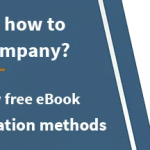These are undoubtedly the most frequently asked questions in our meetings with clients: How much does it cost to sell my company? How much does an advisor receive from the purchase/sale of my company? The answer is a classic and can be summarized in two words: it depends. Throughout this article we will develop this answer, and most importantly we will explain the cost of advisory services in the sale of a company.
The first thing to understand is how many professionals you need to sell a company: a financial advisor, a lawyer, a tax advisor and a notary are the crucial figures. As you can see, many individuals are needed, and each one charges for their services in some form. When you decide to sell your company professionally, you will have to ask them about their fees.
[If you want to read more about the different figures involved in the process of buying and selling a company, read the following article: Whether Buying or Selling a Company: Pick the Right Advisor Or this one: Why is it important to have an advisor?]
We are going to focus on the financial advisor, our role in the process, the first link in the chain and the one that will accompany you in understanding how much it will cost to sell your company.
Generally, when you contact financial advisors to discuss your company’s sale, you will find there are two types of fees: fixed fees and success fees.
Fixed fees or Retainers
Fixed fees or retainers are charged regardless of the outcome of the process. They are commonly associated with documentation delivery or with the achievement of specific landmarks during the sale process [Read more about the operation of a company’s transaction in the article The selling process of a company]. It is not uncommon for the advisor to offer to deduct these fixed fees from the success fees. The truth is that they usually only represent a tiny part of the total costs in the event of a deal closure. However, they are still a cost that the business owner must “advance”.
The controversy around fixed fees is their relevance, that is, should I pay them or not? This doubt arises because some advisors work only on a success basis. There is a proverb that says: “What does not cost is not valued”, and another: “If you pay peanuts, you get monkeys” or “You get what you pay for”.
When a business owner starts the process without spending a penny, they have not embraced the sale of the company and they will always be tempted to pull out at any time. Also, a business owner who does not trust their advisor will think that if they have not made the right choice of advisor, at least they have not spent any money. Perhaps the business owner has repeatedly heard cases of friends saying “they charged me and did nothing”, or perhaps they have already experienced it themselves. While we cannot guarantee that this will not happen, most of the time this lack of professionalism occurs when the transaction has been put into the hands of people who do not work exclusively in this profession. There are some excellent professionals who will dedicate many hours to the sale of your company:
- Ask your lawyer, your tax advisor, a competitor who has already sold, or search on the internet for reference.
- Even if you believe that you have found an advisor in your first meeting, try to obtain a few different proposals and compare them.
- Remember that you are only going to sell your company once.
[Read more about the importance of advisors in this article: Why it is essential to have an advisor?]
Let us go back to the option of not paying fixed fees, but now let’s look from the advisor’s side. Not having an initial fee in the process will also affect the advisor and could generate a conflict of interest in the long run, as they may want to close a deal at any cost and without considering whether the chosen buyer is the best option for their client. This would, in part, be due to the advisor’s fear of not closing the transaction and thus not obtaining any fee (if everything is dependent on success), despite having given away time and work.
Negotiate hard, defend your money, and make sure they will protect your interests, but always seek a fair agreement for both of you.
But what is fair? This is a question that has no easy answer, especially when, as in our case, we sit down with companies that go from 5 million in revenues to 500 million. Each of them has different peculiarities and complexities. But what we can say is that at ONEtoONE, each project no matter how small, will have at least two people working on it and could have up to ten. Think about the cost of a senior employee in your company and the hours that they will dedicate each month to a project, and you will have a very rough idea of the price range for fixed fees.
[If you want to know more about how long it takes to sell a company, read our article How long does it take to sell a business?]
Success Fees
These fees are understood and accepted by all clients. Their name says it all; they are obtained upon the completion of a project, whether that is selling or buying a company that you have been looking for.
However, they can also be complex to calculate. In the sale of a company, the norm is to pay a percentage of the company’s agreed value, since the higher the price achieved, the greater the reward for both the client and the advisor. And what is the percentage rate applied? Again, this is difficult to answer, but there is at least a commonly accepted rule: the rate will be inversely proportional to the transaction size; that is, higher percentages will be incurred in smaller transactions, and lower rates will be incurred in larger transactions.
Do not get carried away by what a friend who has read in a newspaper about a large transaction tells you, because that is another league. The purchase/sale of a family company is not governed by the figures of Nasdaq-listed companies. The risk of selling, or rather not selling, a small or medium-sized family business is much greater than in large multinationals. For greater risk, there is a higher cost. The range of rates is very wide for family companies, and usually goes from 1% for large transactions to 6% for small transactions, based on the transaction value.
Make sure you demand that the rate applied to your transaction is justified. To avoid surprises about how much it will cost to sell your company, grab a calculator and with an estimated value of your company, do the calculations to avoid scares or misunderstandings in the future.
If you have got this far, the ‘it depends’ answer that we used at the beginning of the article to respond to how much it costs to sell your company should already be clear. Now all that remains is for you to put pen to paper. Contact us and tell us about your case with complete confidence, in a confidential process and without any obligation from you:
The information in this form goes only to our team of advisors and is treated confidentially. We will contact you at the phone or email that you have left us confidentially, so make sure that it is yours. If you prefer, we will send you a confidentiality letter. Then we will ask you about your company’s activity, financial numbers from the last few years, the reason for the sale, who the shareholders are, and what your price target is, among other questions. Keep this information handy and in electronic format because we may ask you to do a convenience analysis and establish a proposal. All of this may take a couple of weeks and will be at no cost to you.




